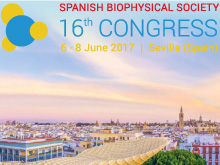Seville, June 2, 2017. From June 6 to 8, the Isla de la Cartuja Scientific Research Center (cicCartuja) will host the XVI Congress of the Biophysical Society of Spain (SBE), whose organizing committee is chaired by Irene Díaz Moreno, professor at the University of Seville and researcher at the Institute of Chemical Research.
The XVI SBE Congress will present the results of the most recent research and will be attended by more than two hundred researchers of recognized international prestige, such as Sir Alan Fersht, Emeritus Professor at the University of Cambridge, and Anthony Watts, President of the European Biophysical Society.
The plenary conferences will form the backbone of the congress, although they will not be the only activity included in the program. This event will include poster sessions and oral communications by delegates, whose interventions have been given special importance in this edition. The program also includes sponsored seminars and the exhibition of stands with the latest developments from leading companies that offer research support services.
Applications of Biophysics
Biophysics studies life from all its perspectives, building bridges between Biology, Mathematics and Physics. Biophysicists rely on these disciplines to shape their research in the search for paradigms and patterns that can explain biological phenomena.
Throughout the 20th century, Biophysics made great progress in the treatment of diseases such as diabetes or cancer. Discoveries as relevant as the discovery of the structure of DNA were also carried out by biophysicists.
However, its applications go further and biophysicists can also be found researching in a multitude of fields linked to various industries or implementing the improvement and care of the environment.
Biophysics in the City: Molecular Cooking
Sponsored by the University of Seville, scientists from the Institute of Chemical Research (IIQ), attached to cicCartuja, will hold the Biophysics in the City: Molecular Cooking outreach activity in parallel. The activity is open to the public, is free, and will take place on June 8th from 11 a.m. in front of the University Rectorate, on San Fernando Street.
Attendees will become familiar with the scientific basis on which such an everyday act as cooking is based and will learn about the possibilities that science offers to gastronomy, allowing them to explore new culinary horizons.
Through interactive presentations, experiments and recipes, researchers will show attendees how processes such as spherification (forming solid spheres that contain a food in a liquid state) or gelation (using gels to create solid textures) are carried out. Both processes are the key to the production of “caviar” of countless colours and flavours in the new cuisine.
During the activity, the safety of the ingredients used in Molecular Cuisine will be discussed. In addition, an overview will be given of more chemical compounds that are currently being used in kitchens and whose origin is in the laboratory.
More information at: http://sevilla2017.sbecongress.org



